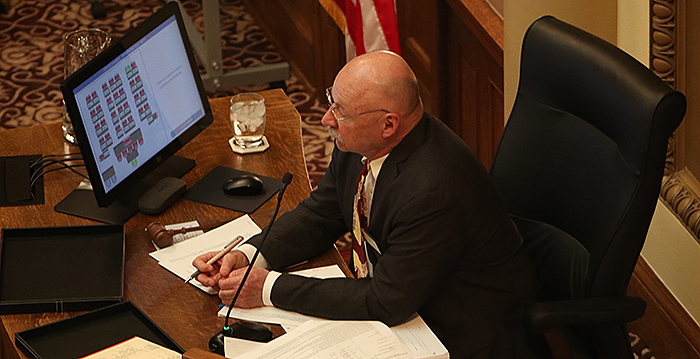AARP Hearing Center

2023 Corporations, Elections, and Political Subdivisions Committee
Committee Chairs (click to meet the committee)
Senate - Cale Case
House - Jared Olsen
Senate committee members - Eric Barlow, Brian Boner, Bill Landen, Charles Scott
House committee members- Forrest Chadwick, Jeremy Haroldson, Steve Harshman, Chris Knapp, Sandy Newsome, Pepper Ottman, Cody Wylie, Mike Yin
The Corporations, Elections, and Political Subdivisions Committee of the Legislature had a very busy interim, forwarding 13 committee bills to the session, covering everything from election changes to retail liquor licenses.
Legislative veteran Cale Case (Photoed above) will chair the Senate side of the Committee, while Jared Olsen moves over from the House Judiciary Committee to lead the House Corps Committee. Case has been on Corps for some time and was the committee’s chairman for more than a decade before he moved over to the Senate Revenue Committee four years ago.
“Corporations is my true love for sure,” Case says. “It is a collaborative committee. People are trying to solve problems and it attracts some good minds. People care about the issues and want to be on the committee. It is not a place that is very partisan, there just isn’t much partisan stuff that happens in Corporations.
“My goal is to continue those very high standards and work with my new chairman who has never been on corporations before, though he is a very knowledgeable attorney and I look forward to working with Jared.”
AARP Wyoming members will likely be most interested to check out potential changes to the state’s elections. A continuing theme over the past two years has been an interest in a runoff election for the state’s five statewide elected officials, or state legislative candidates who don’t gain more than 50% of the popular vote. “We have the problem where people move forward with less than a majority. It tends to happen a lot in Wyoming in a crowded primary election.”
Runoff elections are not without their challenges, especially lowered voter turnout and increased partisanship. Conceivably, an instant runoff, also known as ranked choice voting, could address the issue.
The instant runoff is a relatively new concept in which voters vote for their first choice for an office, then second, and third. If no candidate has reached the 50% threshold of first-place votes, then the candidate who has the fewest votes is removed from the voter rolls and their second and third place votes go to the remaining candidates until there is a 50% threshold for one candidate. Alaska used a similar system during its most recent elections and, while some feel the process can be confusing, recent polling by “Alaskans for Better Elections,” suggests otherwise with 92% of those polled stating they felt informed about rank choice voting. Seventy-nine percent said rank choice voting was simple, while 20% thought it was complicated.
HB49 would allow a pilot of sorts as municipalities could try rank choice voting in nonpartisan elections.
“I hope we pass the bill and it is out there and available to municipalities to be able to use for their elections,” Case says.
Aside from HB49, the committee voted in the interim to sponsor election bills related to the order of candidates on the ballot (HB55), election equipment (HB47), voter registry ID which would keep and private voting records (HB5). More specifically:
- HB55 would rotate whose name is listed first on ballots from election to election.
- HB47 would make sure every electronic voting machine in Wyoming is certified by the Secretary of State in several areas, including software versions, and meets guidelines adopted by the US Election Assistance Commission.
- HB5 would add a unique identifying number generated by the state for every
There will also be some liquor license discussion in the Corps Committee in 2023.
- SF3 will allow licensing authorities to determine their own liquor license fees, anywhere from $300 on the low end to $1,500 on the high end.
- SF12 would create a new type of liquor license for taverns and entertainment establishments. This means an establishment where food, alcohol, and malt beverage are sold to be consumed on the premises and the primary revenue source is from the sale of entertainment, food, or a combination of both and not the sale of alcohol. This license would not be allowed to be sold, transferred or assigned by the holder.
- SF13 would change the formula by which a community could authorize bar and grill liquor licenses.
“In Wyoming there has been a general trend towards liberalizing liquor sales,” Case says. “Over the years, there has been more opportunities for more and different license types. This continues that trend. I am a liquor license owner as my hotel has a resort license, so I have a conflict on these bills, and I am very up front about that. They will absolutely get a fair hearing, but I will recuse myself from voting on them.”































































